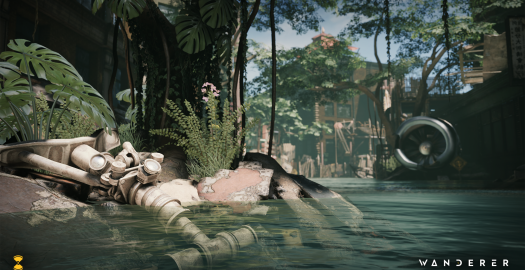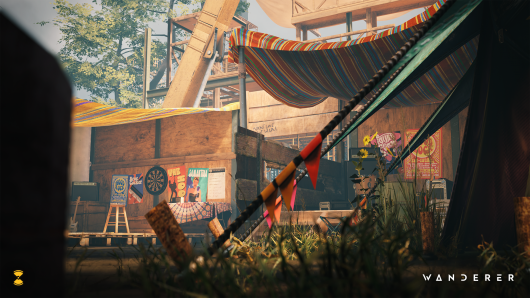Review for Wanderer
Wanderer is a time-hopping first-person puzzler that, thanks in large part to its VR-only presentation, is quite unlike any other adventure game I’ve played.
The game opens on the cusp of 1959 in a laboratory, sporting a muted color palette. I was impressed when I interacted with a chalkboard using my Quest controllers and found that not only could I freely scribble on it, but an attempt at writing my signature looked great and surprisingly close to my actual handwriting. The future is now!
Soon after this prologue, the game leaps forward a century and you emerge into a post-apocalyptic Boston in 2061, where nature has (quite beautifully) overtaken the urban sprawl. Your grandfather was a gifted inventor, and your mission is to make the long trek to his secret apartment and use the tools he’s left for you to benevolently alter time – all in the hopes of saving the world from its present fate.
The city has some impressively expansive vistas, but don’t expect graphics quite on the level of VR flagships like Half-Life: Alyx. Some of the buildings feel lived-in but don’t always make architectural sense. One apartment I dropped down into (via a hole in its ceiling) contained a single door to its bathroom and no exit whatsoever, aside from climbing through a broken window. While not an outright immersion-killer, it’s a detail that makes the game’s moderate budget a little more apparent.
Refreshingly, there are plenty of nifty optional interactions that flesh out the environment, like being able to load an old film reel onto a projector and flip it on, which rewards you with a trailer for an in-world documentary about climate change (and hinting at how the world got to where it is).
You’ll also meet the first of many NPCs in the early game. Character animation is a little stiff but gets the job done. For the most part, other characters don’t move around too much, preferring to stand in one spot while delivering exposition. Interaction is quite limited with other characters – you don’t get dialogue options, and they won’t react to your unscripted behaviors. When boarding a boat captained by an ally, she didn’t seem to mind being repeatedly smacked in the head with a bat and shovel I had picked up from an onboard hold. It’s a forgivable quirk inherent in VR – free from the confines of canned animations, there are presumably way too many ways for players to interact with NPCs for a game to anticipate and simulate believably.
When you finally arrive at the apartment, the game opens up. This location itself is a bit of a show-stopper: filled to the brim with lovingly handcrafted detail across a handful of cozy rooms. I got so attached to the space that I spent a good several minutes picking up cockroaches off the floor and dropping them out the window in a futile attempt to clean the place up a bit, only to realize that objects dropped off the map respawn where they came from (usually… more on that later). It soon becomes a hub for time traveling to other eras, and also the first of many areas that serve as an escape room of sorts, packing in tons of puzzles and hidden secrets in a limited space. These aspects are where Wanderer truly shines.
The apartment is where you’ll meet your sidekick throughout the rest of the quite lengthy adventure: Samuel, a cute yet sassy little robotic helper (with a charming Southern drawl) whom you’ll wear like a wristwatch. Samuel functions as your inventory and delivers the game’s central mechanic, where you’ll insert key items into a slot on the back of your timepiece, which then warps you to various locations across space and time.
You’ll jump to an impressive variety of historically significant moments, such as the 1969 moon landing, the dusk of the Mayan civilization, and Nikola Tesla’s Wardenclyffe Tower in the early 20th century, always hot on the heels of a time-traveling saboteur throwing wrenches in the works of history – sometimes in minor ways, and sometimes in massive, world-shaping ones. By the time I reached the game’s midpoint, a lengthy excursion through a massive WWII-era German military outpost, I was expecting the story to soon wrap up, but there was still much more time-hopping to come.
Due to the sheer number of locations (including multiple timelines for the same space), Wanderer is one of the longest VR games I’ve played. Unfortunately, it’s also one I had to space out quite a bit because playing for more than an hour gave me a headache. Even a few minutes of gameplay was enough to make me queasier than any other VR game I’ve tried. Thankfully, in addition to the free-roam locomotion option, the game offers a teleport-based control scheme, which I relied on heavily to fully enjoy the game. (Pro-tip: load up on ginger candy if you tend to succumb to motion sickness… it made a difference for me!)
One thing I liked about the VR interaction system is that your floating in-game hands have physics properties of their own, rather than ethereally clipping through the environment like many other titles. This means you don’t have to hold onto something to move it. You can slide objects around on the floor, lean your wrist against doors to open them, and even run down hallways with your arms out to the side, airplane-style, knocking over everything in reach with a satisfying slap. It rarely serves an in-game purpose, but it’s immersive and undeniably fun.
Less fun is when an object falls out of the playable area and requires a restart of the chapter. As I mentioned, Wanderer does a decent job of respawning items thrown out of windows and into rivers (for the most part), but on a few occasions, I had key objects get stuck in unreachable areas after I recklessly tossed them about. A large recent update, provided after this review, adds an autosave system that should alleviate headaches like the one I faced, so future players hopefully won’t be forced to restart entire chapters when something goes wrong.
I also found myself getting stuck despite an admirable in-game hint system. Your robot friend Samuel is cleverly utilized for this feature, allowing you to summon him from your wristwatch to give you a nudge in the right direction. His voice acting is a delight to listen to, but often his hints weren’t enough for me to make progress, requiring a different and more regrettable kind of summoning: alt-tabbing to a walkthrough.
One interesting feature that sets Wanderer apart is the limited but upgradeable inventory. Aside from what you’re carrying in your hands, you can only store a couple of items at the onset of the game. By discovering little glowing crystal shards (the game’s version of an in-game currency) you can spend these back at your apartment home base to increase how many items can be stored at once. Crystals are usually quite liberally sprinkled around in obvious locations, but hunting down all of them takes some lateral thinking and a bit of persistence. The developers make pretty good use of the space, so the crystals can be hidden at the back end of drawers, inside pots, or in other places that might require an unorthodox perspective to find.
The main purpose of the limited inventory is to encourage you to only pick up what’s strictly needed at the moment so that you’ll return to the various ages to grab items you might not have had space to take with you the first time around. You’ll be doing a lot (and I mean a lot) of time-jumping to bring items from one time period to solve puzzles in another. Sadly, this is where the game makes its biggest stumble. By arbitrarily restricting what you can carry, the game simply does nothing but delay players from solving puzzles. There is nothing particularly clever on the part of the player here – you need an item that’s not in the current scene, so you warp out of your current level back to the apartment, then warp from the apartment to the right era, pick up the thing you need, warp back to the apartment, and then warp back to where you were in the first place.
I cannot stress how much less aggravating this would have been had the game let you bypass the apartment hub entirely during this process, and simply swap time periods on the fly. Alas, this quadruple jump process (each jump requiring a brief wait as the scene loads in – not too bad for most VR-capable graphics cards, but still a definite “flow interrupter”) made me hesitant to do it, every single time.
The constant backtracking also works against the game’s premise as a series of “escape rooms.” Rather than experiencing and immersing yourself fully in self-contained puzzle arenas, you have to do quite a lot of mental juggling to remember what items are in what time periods, in case they become relevant to whatever future task confronts you. A more generous inventory would have worked wonders here. For players who have trouble recalling every potentially useful item from eras they’ve already visited, this bit of (frankly irritating) game design will add hours of nothing to an already long experience.
Still, not all the backtracking is bad news. For several instances, you’ll end up returning to a time period that seemed unimportant your first time there, but through newfound items, abilities, or story changes, whole new paths and challenges will become unlocked. Some eras – which might seem like quick little transition levels on previous visits – come back with really satisfying payoffs that are too fun to spoil here. Fair warning though: the final stretches of the game switch things up in a major way, throwing you into several combat sequences with first-person shooting. I wasn’t bothered by this, but traditional adventure gamers may balk at the twitch-based action skills required to progress.
Also, those functional chalkboards I was so impressed with in the first minutes, that seemed to serve no in-game purpose? That feature finally has a triumphant payoff in a sequence involving Morse code, one of the game’s most entertaining puzzles. I could have done with a bit more of this and a little less cogwheel placement, but overall the puzzles delighted more than they frustrated.
Wanderer does a lot right. I couldn’t help but feel that a tighter pace (and a clearer sense of what to do) would have made for a more engaging, if shorter, game. But if you’re a time travel fan looking for a good bit of escapism, Wanderer's finely polished presentation of the past makes it a solid choice that’s easy to recommend.































